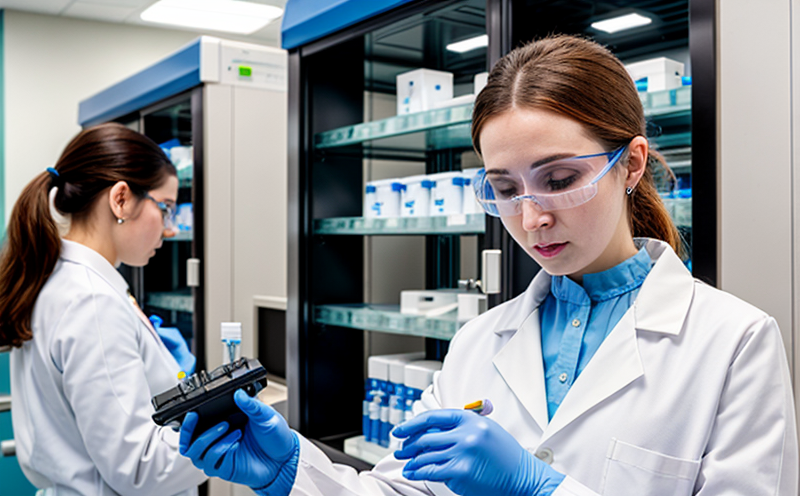Bioanalytical Method Development Testing
bioanalytical method development testing is a critical component of pharmaceutical quality assurance and compliance. This service involves developing analytical methods that can accurately quantify drug substances or metabolites in biological matrices such as blood, plasma, urine, and tissue samples. The primary goal is to ensure the reliability and precision of these methods for use in clinical trials and post-market surveillance.
The process begins with thorough literature review and understanding of current regulatory guidelines like ICH Q2(R1), which specify the requirements for bioanalytical method validation. Method developers must consider various aspects including linearity, accuracy, precision, specificity, extraction efficiency, matrix effects, and robustness. These factors are crucial in ensuring that the methods can consistently provide accurate results over time.
Once a suitable approach is identified, method development proceeds through several stages: initial feasibility studies, optimization of parameters such as mobile phase composition for chromatography or excipients for extraction processes, followed by rigorous validation using appropriate sample types. Throughout this process, attention must be paid to potential interferences from co-formulants present in the drug product itself.
After successful completion at the lab scale, methods are transferred into manufacturing environments where they undergo further optimization and qualification steps aimed at ensuring reproducibility across different facilities. This transfer phase often involves extensive characterization studies to ensure that any changes introduced during scaling do not adversely affect method performance.
A key aspect of bioanalytical method development testing is its role in supporting regulatory submissions. By providing robust, validated methods early in the drug lifecycle, sponsors can demonstrate compliance with pharmacokinetic/pharmacodynamic (PK/PD) studies required for IND filings or NDA/MAA applications. Additionally, these methods form part of the data package submitted during preclinical and clinical phases, helping regulators make informed decisions about product safety and efficacy.
In summary, bioanalytical method development testing plays a pivotal role in ensuring that pharmaceutical products meet stringent quality standards while supporting regulatory compliance. Its importance cannot be overstated given its direct impact on patient health outcomes.
Why Choose This Test
Selecting the right bioanalytical methods for your project is essential to achieving accurate and reliable data, which is critical in the pharmaceutical industry where even minor discrepancies could lead to costly delays or failures. Our comprehensive approach ensures that we provide solutions tailored specifically to meet your unique needs.
Our team of experienced scientists uses cutting-edge technology combined with decades of collective expertise to develop robust bioanalytical methods capable of handling complex samples effectively. We stay current on regulatory updates and industry best practices, ensuring that our methods comply with all relevant standards including ICH Q2(R1).
We understand the importance of timelines in drug development processes; therefore, we aim to deliver high-quality results within tight deadlines without compromising accuracy or precision. Our state-of-the-art facilities equipped with advanced instrumentation allow us to handle a wide range of sample types efficiently.
Moreover, choosing our service means gaining access to extensive support throughout the entire process—from initial consultation through final validation. We offer detailed reports tailored specifically for your project requirements and provide ongoing assistance whenever needed. This level of commitment helps ensure seamless integration into your overall strategy.
By partnering with us, you gain more than just a reliable partner; you also receive valuable insights that contribute to informed decision-making throughout the drug development lifecycle. With our support, you can focus on what matters most—innovation and patient care.
Quality and Reliability Assurance
The quality and reliability of bioanalytical methods are paramount in ensuring accurate and consistent results across all stages of pharmaceutical research and development. At our laboratory, we adhere strictly to international standards such as ICH Q2(R1), which provide clear guidelines on method validation criteria.
Our rigorous validation process includes extensive linearity studies over the expected range of concentrations typically encountered during clinical trials or therapeutic use. We also conduct accuracy assessments using certified reference materials (CRMs) according to recognized procedures like those outlined in ISO/IEC 17025:2017, ensuring that our methods produce consistent results under varying conditions.
Precision is another critical factor considered during method development. Reproducibility studies are conducted multiple times by different analysts using various instruments if necessary to demonstrate that small variations do not significantly affect the outcome. Robustness tests further confirm that minor changes in experimental parameters have minimal impact on performance, enhancing confidence in long-term stability.
In addition to these technical aspects, we employ strict quality management systems based on ISO/IEC 17025:2017 requirements to maintain high standards consistently across all departments. Regular internal audits and external inspections help identify areas for improvement ensuring continuous enhancement of our services.
By adhering strictly to these stringent protocols, we guarantee that every bioanalytical method developed meets the highest levels of quality assurance and reliability. This commitment not only enhances trust but also supports successful regulatory submissions and clinical trial approvals.
Competitive Advantage and Market Impact
The development and implementation of robust bioanalytical methods offer significant competitive advantages in today's fast-paced pharmaceutical landscape. These advanced analytical techniques enable companies to gain deeper insights into drug behavior within the body, leading to improved product performance and enhanced therapeutic benefits.
One key advantage is the ability to optimize dosing regimens more accurately by quantifying active ingredients precisely across different patient populations. This precision helps minimize side effects while maximizing efficacy, ultimately improving patient outcomes. Accurate bioanalytical data also facilitates better understanding of drug metabolism and pharmacokinetics, enabling更快





